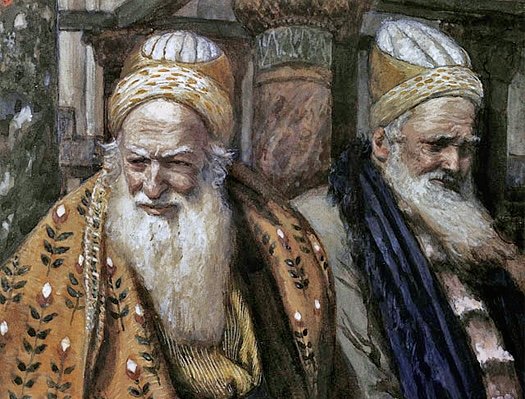
We don't get brownie points for sacrificing more than God asks of us. So it's important that we take the time to understand what it is that God requires of us as workers in His kingdom, regarding the families that He has entrusted us with.
In considering this over the past few weeks, I remembered that time when Jesus said "Follow Me" to a man who responded, "Lord, let me first go and bury my father."
In response, Jesus said, "Leave the dead to bury their own dead." [1]
Clearly Jesus was talking about that man renouncing his family to follow him, right?
Couple that with Jesus' admonition, "If anyone comes to me and does not hate his own father and mother and wife and children and brothers and sisters, yes, and even his own life, he cannot be My disciple" [2], and its case closed, right?
Not so fast.
When we are examining these passages, we must never forget to remember the context in which they were uttered, and also examine them in light of Jesus' others teachings. We cannot afford to isolate them and then use them as guiding principles for our lives when we might not even be interpreting them correctly.
Let's start with a fundamental statement made by the apostle John: "God is love." [3]
If God is love, then all of these statements need to be examined with this in mind. Remember, neglect is not love.
What other relevant statements and actions made by Jesus and His disciples might have a bearing on this?
Well, Jesus once rebuked the Pharisees in this way:
"You have a fine way of rejecting the commandment of God in order to establish your tradition! For Moses said, Honor your father and your mother’; and, Whoever reviles father or mother must surely die.’ But you say, ‘If a man tells his father or his mother, “Whatever you would have gained from me is Corban”’ (that is, given to God)— then you no longer permit him to do anything for his father or mother, thus making void the word of God by your tradition that you have handed down. And many such things you do."
(Mark 7:9-13, ESV)
What if in "sacrificing" our families for the sake of the Gospel, we are actually doing the exact same thing as those whom Jesus rebuked? What if we are taking the things that God has set aside for our families, and claiming instead that we are giving them to God? What if this is not what He actually asks of us? What if we are acting like disciples of the Pharisees instead of disciples of Jesus?
After all, the apostle Peter said, "See, we have left everything and followed you."
Jesus responded, "Everyone who has left houses or brothers or sisters or father or mother or children or lands, for my name's sake, will receive a hundredfold and will inherit eternal life." [4]
But what did Peter mean when he said he'd left everything? Peter had given up these things, and yet he went back home. He went back to his mother-in-law's house when she was sick, and asked Jesus to heal her. (Jesus did.) [5]
And yet, when Jesus' family came to see Him as He was teaching, after His exclamation that His mother and brothers were those who hear the word of God and do it [6], He actually went out to talk with His flesh-and-blood mother and brothers.
And yet, when Jesus was on the cross, dying, He gave His apostle John the responsibility of taking care of His mother. This was the oldest son's job in Jewish culture. And Jesus had passed it on to John. The implication is that Jesus had been fulfilling His filial duty up until that point.
So let's return to the previous two statements that are often used to justify abandoning our families for the sake of Christ.
What if "let the dead bury their own dead" is not about skipping a funeral, but about challenging us to not delay following Christ in favour of some abstract eventuality?
Perhaps an example will be helpful. At one point many years ago, I had a missionary friend who met with a couple and shared with them about her plans for future ministry. My friend invited the couple to come on as financial partners, but they refused. "We are about to start a family, so we aren't going to be taking on any financial responsibilities at this time," they said.
This made me very sad. Not because the couple weren't going to be partnering with my friend, but because there was no guarantee of if or when they might actually have had a baby after they started trying. It could be a year, or it could be 10 years. That couple was putting their potential usefulness for the kingdom of God on hold while they waited for some abstract possibility that wasn't guaranteed to happen. A decade later, they were still waiting.
What about the passage that talks about hating our own family members in order to be disciples of Jesus?
Over my time in ministry, I have run across a number of people who are dark triad individuals. Thought most missionaries aren’t this way, it deeply bothers me that the application of this verse can lead us to act in psychopathic ways towards our family, ignore their suffering, neglect our family duties, and somehow be cheered on as heroes of the faith for our strength and dedication in doing so.
Let's keep in mind that this passage is actually directed not only to missionaries but every person who calls themselves Christians. This is a passage talking about the requirement to love Jesus above every other person. This has nothing to do with hate. This has everything to do with the magnitude of love we have for Jesus.
This does not mean that we are indifferent to our families; this does not mean that we are indifferent to their suffering or their pain. This does not mean that we abandon them. This means that we subject our love and care of our families to our love of Christ. That means that we allow Him to show us how to best take care of our families even while we are separated by hundreds or thousands of miles.
That's why, when my own mother started to decline rapidly in her health, Peter and I prayed to God and asked Him to guide us on when to come back to Canada. He knows her true situation, and He knows her future. He knows which ministries we are capable of continuing even remotely from Canada, and which we will need to be put on pause. He knows the condition of the hearts of the people we minister to, and He knows the needs of my family members—things that they don't even recognize themselves. I may be not be able to juggle all of these factors successfully, but He can. So we submitted our decision making to Him. Other people's opinions didn't matter. Only His did. And this is loving God above all else.
Since this was an unexpected situation, we didn't have anywhere near the amount of money required to come back to Canada on such short notice. But, we had committed to obeying God, wherever He led. We resolved to pay the $1000 set of PCR tests, the quarantine hotel, the airline tickets, and so on by taking money out of our retirement savings. It wasn't ideal from a financial perspective, but God had spoken, and we would obey whatever the cost.
The day after we finished booking everything, something amazing started to happen. God began to speak to the hearts of His people and moved them to contact us, to give us money, and by the time our quarantine had ended every single expense had been met. Someone had even promised the use of their car while we’re here! It wasn't necessary to take out a single penny from our retirement savings.
You see, when God asks us to do something, when we take a step of faith to obey Him, He also supplies the ability to obey.
We see this in the parable of Jesus feeding the 5000. "You give them something to eat,"Jesus told his disciples. And then, when they came back to Him with the five loaves and two fishes, Jesus broke them apart and multiplied them. Jesus gave the food back to the disciples, and the disciples did indeed give the people something to eat. [7] This is the wonder of serving the God who holds the universe in his hands.
I often refer back to an idea that I first came across in a book called Leading on Empty, by Wayne Cordiero. In it, he points out that we each have different spheres of influence. Some spheres, like the influence we have in our relationships with our spouses, children, and families, can only be done by us. There is no one else who can be an elder daughter to my mother. There is no one else who can be a wife to my husband. The responsibilities I have to my family cannot be mimicked or filled by anyone else.
By contrast, the things I do in my ministry often can be duplicated by someone else. Perhaps not quite as well, or in the same way, but certain substitutions can be made. If I allow myself to think that I am the hero, the only one who can do the things that I do in my ministry, then I start to take credit for God's work. I start to puff myself up as indispensable and stop acknowledging the truth that God can accomplish great and marvellous things, whether I'm present or not. The kingdom of God doesn't depend on me. It depends on Him.
The end.
NOTES
To read the first instalment of this series, click here.
[1] Luke 9:59-60
[2] Luke 14:26
[3] 1 John 4:8
[4] Matthew 19:29
[5] See Luke 4:38-39
[6] See Luke 8:21
[7] See Mark 6:35-44
(Picture source)










